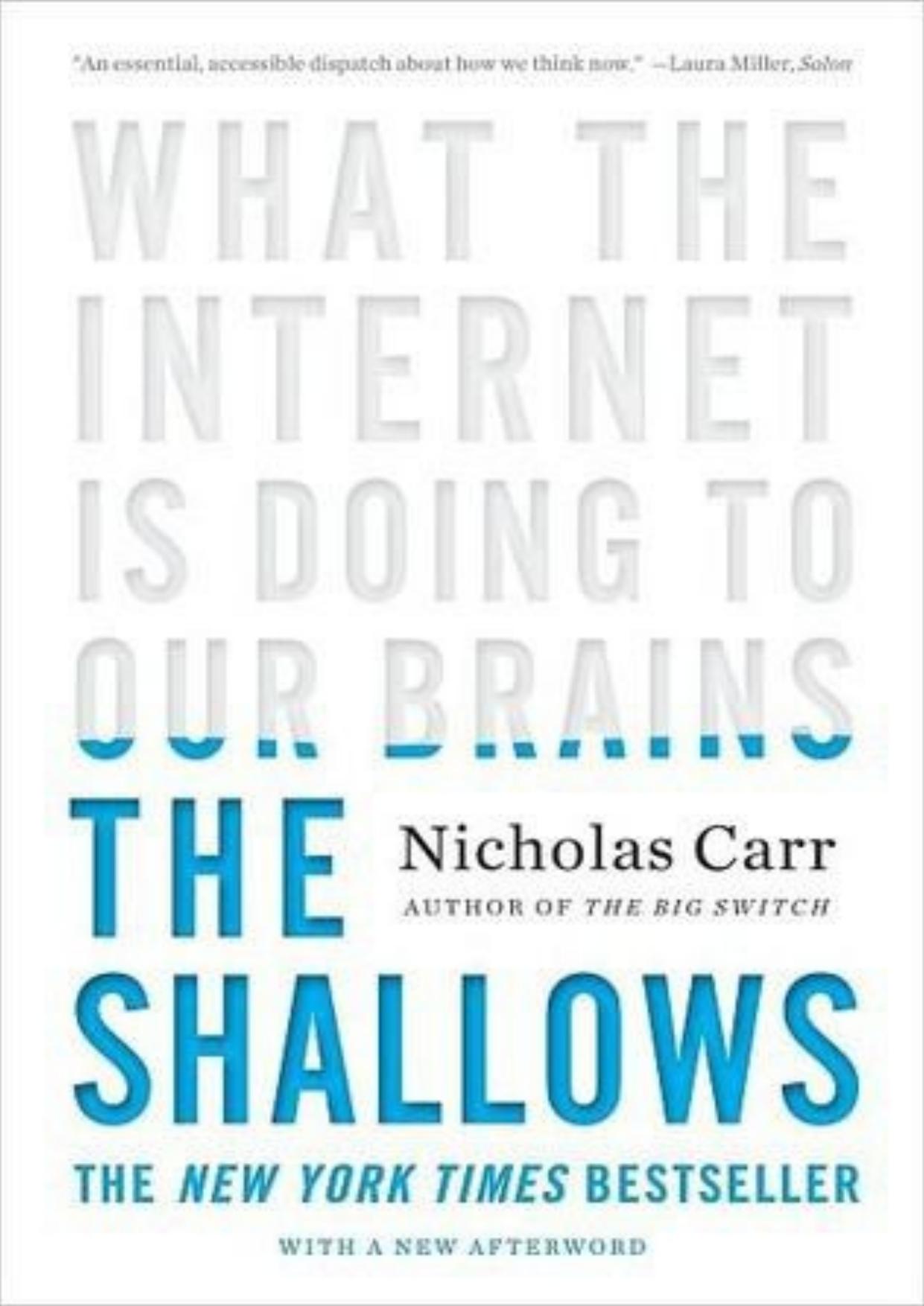The Shallows: What the Internet Is Doing to Our Brains by Nicholas Carr

Author:Nicholas Carr
Language: eng
Format: mobi, epub, azw3, pdf
Tags: Philosophy & Social Aspects, Science
ISBN: 9780393079364
Publisher: W. W. Norton & Company
Published: 2011-06-06T00:00:00+00:00
THE WEB COMBINES the technology of hypertext with the technology of multimedia to deliver what’s called “hypermedia.” It’s not just words that are served up and electronically linked, but also images, sounds, and moving pictures. Just as the pioneers of hypertext once believed that links would provide a richer learning experience for readers, many educators also assumed that multimedia, or “rich media,” as it’s sometimes called, would deepen comprehension and strengthen learning. The more inputs, the better. But this assumption, long accepted without much evidence, has also been contradicted by research. The division of attention demanded by multimedia further strains our cognitive abilities, diminishing our learning and weakening our understanding. When it comes to supplying the mind with the stuff of thought, more can be less.
In a study published in the journal Media Psychology in 2007, researchers recruited more than a hundred volunteers to watch a presentation about the country of Mali played through a Web browser on a computer. Some of the subjects watched a version of the presentation that included only a series of text pages. Another group watched a version that included, along with the pages of text, a window in which an audiovisual presentation of related material was streamed. The test subjects were able to stop and start the stream as they wished.
After viewing the presentation, the subjects took a ten-question quiz on the material. The text-only viewers answered an average of 7.04 of the questions correctly, while the multimedia viewers answered just 5.98 correctly—a significant difference, according to the researchers. The subjects were also asked a series of questions about their perceptions of the presentation. The text-only readers found it to be more interesting, more educational, more understandable, and more enjoyable than did the multimedia viewers, and the multimedia viewers were much more likely to agree with the statement “I did not learn anything from this presentation” than were the text-only readers. The multimedia technologies so common to the Web, the researchers concluded, “would seem to limit, rather than enhance, information acquisition.”25
In another experiment, a pair of Cornell researchers divided a class of students into two groups. One group was allowed to surf the Web while listening to a lecture. A log of their activity showed that they looked at sites related to the lecture’s content but also visited unrelated sites, checked their e-mail, went shopping, watched videos, and did all the other things that people do online. The second group heard the identical lecture but had to keep their laptops shut. Immediately afterward, both groups took a test measuring how well they could recall the information from the lecture. The surfers, the researchers report, “performed significantly poorer on immediate measures of memory for the to-be-learned content.” It didn’t matter, moreover, whether they surfed information related to the lecture or completely unrelated content—they all performed poorly. When the researchers repeated the experiment with another class, the results were the same.26
Kansas State University scholars conducted a similarly realistic study. They had a group of college students
Download
The Shallows: What the Internet Is Doing to Our Brains by Nicholas Carr.epub
The Shallows: What the Internet Is Doing to Our Brains by Nicholas Carr.azw3
The Shallows: What the Internet Is Doing to Our Brains by Nicholas Carr.pdf
This site does not store any files on its server. We only index and link to content provided by other sites. Please contact the content providers to delete copyright contents if any and email us, we'll remove relevant links or contents immediately.
Sass and Compass in Action by Wynn Netherland Nathan Weizenbaum Chris Eppstein Brandon Mathis(7402)
Grails in Action by Glen Smith Peter Ledbrook(7296)
Kotlin in Action by Dmitry Jemerov(4638)
Management Strategies for the Cloud Revolution: How Cloud Computing Is Transforming Business and Why You Can't Afford to Be Left Behind by Charles Babcock(4131)
The Age of Surveillance Capitalism by Shoshana Zuboff(3423)
Learn Windows PowerShell in a Month of Lunches by Don Jones(3242)
Mastering Azure Security by Mustafa Toroman and Tom Janetscheck(3027)
Mastering Python for Networking and Security by José Manuel Ortega(2951)
Blockchain Basics by Daniel Drescher(2891)
TCP IP by Todd Lammle(2639)
Microsoft 365 Identity and Services Exam Guide MS-100 by Aaron Guilmette(2609)
From CIA to APT: An Introduction to Cyber Security by Edward G. Amoroso & Matthew E. Amoroso(2483)
Hands-On Azure for Developers by Kamil Mrzyglod(2412)
Configuring Windows Server Hybrid Advanced Services Exam Ref AZ-801 by Chris Gill(2366)
React Native - Building Mobile Apps with JavaScript by Novick Vladimir(2340)
MCSA Windows Server 2016 Study Guide: Exam 70-740 by William Panek(2313)
The Social Psychology of Inequality by Unknown(2311)
The Art Of Deception by Kevin Mitnick(2298)
Azure Containers Explained by Wesley Haakman & Richard Hooper(2259)
